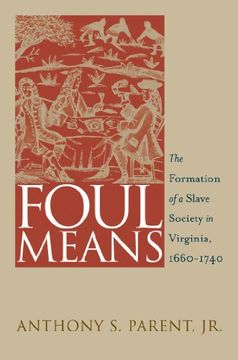Compartir
Foul Means: The Formation of a Slave Society in Virginia, 1660-1740 (Published by the Omohundro Institute of Early American History and Culture and. History and Culture, Williamsburg, Virginia) (en Inglés)
Anthony S. Parent (Autor)
·
Univ Of North Carolina Pr
· Tapa Blanda
Foul Means: The Formation of a Slave Society in Virginia, 1660-1740 (Published by the Omohundro Institute of Early American History and Culture and. History and Culture, Williamsburg, Virginia) (en Inglés) - Anthony S. Parent
58,61 €
61,70 €
Ahorras: 3,08 €
Elige la lista en la que quieres agregar tu producto o crea una nueva lista
✓ Producto agregado correctamente a la lista de deseos.
Ir a Mis Listas
Origen: Estados Unidos
(Costos de importación incluídos en el precio)
Se enviará desde nuestra bodega entre el
Miércoles 26 de Junio y el
Lunes 15 de Julio.
Lo recibirás en cualquier lugar de España entre 1 y 5 días hábiles luego del envío.
Reseña del libro "Foul Means: The Formation of a Slave Society in Virginia, 1660-1740 (Published by the Omohundro Institute of Early American History and Culture and. History and Culture, Williamsburg, Virginia) (en Inglés)"
Challenging the generally accepted belief that the introduction of racial slavery to America was an unplanned consequence of a scarce labor market, Anthony Parent, Jr., contends that during a brief period spanning the late seventeenth and early eighteenth centuries a small but powerful planter class, acting to further its emerging economic interests, intentionally brought racial slavery to Virginia. Parent bases his argument on three historical developments: the expropriation of Powhatan lands, the switch from indentured to slave labor, and the burgeoning tobacco trade. He argues that these were the result of calculated moves on the part of an emerging great planter class seeking to consolidate power through large landholdings and the labor to make them productive. To preserve their economic and social gains, this planter class inscribed racial slavery into law. The ensuing racial and class tensions led elite planters to mythologize their position as gentlemen of pastoral virtue immune to competition and corruption. To further this benevolent image, they implemented a plan to Christianize slaves and thereby render them submissive. According to Parent, by the 1720s the Virginia gentry projected a distinctive cultural ethos that buffered them from their uncertain hold on authority, threatened both by rising imperial control and by black resistance, which exploded in the Chesapeake Rebellion of 1730. |Offering a provocative black interpretation of the development of slavery, Parent argues that during a brief period spanning the late 17th and early 18th centuries, a small but powerful planter class brought racial slavery to Virginia, and, in turn, to America. Parent finds more evidence of pervasive black rebellions during this period than previous historians have suggested, especially the Chesapeake Rebellion of 1730, the largest continental slave rebellion during the colonial era.

